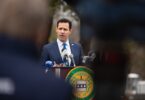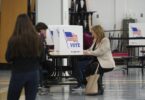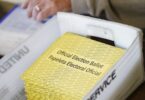The field of Democratic primary election congressional candidates took to the stage at the Epstein Campus of the Bucks County Community College Thursday afternoon to make their cases to voters.
The debate, like previous debates held at the community college campus in Bristol Township over recent elections, was moderated by Bill Pezza, a resident of Bristol Borough and professor at the college.
Pezza opened the debate by introducing each of the candidates: Steve Bacher of Lower Makefield, Rachel Reddick of Bedminster, and Scott Wallace of Buckingham.
Bacher opened up the introductions by giving attendees a brief history of his public service. Bacher was a student, teacher, and administrator at the community college, he explained. He added that climate change is the driving force behind his campaign, noting he has been endorsed by the Bucks County Community College American Federation of Teachers.
Reddick is a domestic violence advocate, attorney, and a Navy veteran.
“I have always fought for what I believe in, and I want to stand up for you in Congress,” Reddick said.
Common sense gun legislation is one of the focal points of Reddick’s campaign, she explained.
“We need a government that works for all of us, not just the wealthy few,” said Wallace during his introduction.
The millionaire philanthropist spoke of the need to remove corporate money from politics and took an opportunity to take a jab at the current Republican Congressman Brian Fitzpatrick and President Donald Trump.
“Between [Fitzpatrick] and Donald Trump, we have moved from a swamp to a sewer,” Wallace told the crowd of mostly Democrats.
Pezza opened up the questioning by asking each candidate about their own specific elephant in the room – Wallace’s residency, Reddick’s turn from Republican to Democrat, and whether Bacher could sustain a campaign.
Wallace explained that after a career in public service has taken him around the world, he has returned to his childhood home in Buckingham. Reddick explained her party affiliation of Democrat and referenced a number of endorsements from sitting Democrats to validate her values. Bacher argued that he represents everyone in the district and not just those who can afford to bankroll a congressional campaign.
Substantive questioning began with Pezza asking the candidates if they agree that Congress has failed in its legislative and oversight duties – Wallace’s residency, Reddick’s turn from Republican to Democrat, and whether Bacher could sustain a campaign.
Wallace made the point that there are two things needed to return rationality to Congress. He said Congress must prohibit the president from utilizing nuclear and conventional military strikes without the approval of lawmakers and that Congress must send every bill through the proper processes before it makes it to the floor for a debate.
“Congress has been derelict in its duties for decades,” Bacher said.
He agreed with Wallace on the need for military strikes to be approved by Congress and also argued that the legislature needed to do something more to secure the integrity of the nation’s voting systems.
Reddick agreed with her peers on requiring Congressional approval before military strikes are considered and argued that veterans are less likely to authorize such force, noting they understand what combat and conflict means for individuals. Reddick also stressed the importance of collaborating and working together to achieve goals in Congress.
Pezza moved towards tangibles and asked the candidates if they would have supported the Republican tax bill passed recently.
“I would not have voted for that abomination,” Bacher said.
Wallace went on to also call the bill an “abomination.”
Reddick also agreed that she would not have supported the bill.
The fourth question Pezza asked probed the candidates on how the party had lost the working class and asked them what they would do or could do to reach that base of voters.
“We need to let them know that we are here for them,” Reddick explained.
A large portion of that voting block feels as though they were left behind, Reddick said, adding Democrats need to stand up as the party who fight for the especially vulnerable.
Wallace said that candidates and the party needs to acknowledge that the people who voted for Donald Trump had a hope that things would be different. Trump’s track record, Wallace explained, shows that people who feel left behind are not high on Trump’s list of priorities.
Bacher explained the importance of creating higher paying jobs and more affordable health care.
The candidates began to separate a bit when they were asked their opinion on immigration reform.
Wallace opened the answers by explaining that “Dreamers,” or the undocumented kids who came to the country as children, should be protected and offered a rapid path to citizenship.
“We cannot deport our way out of this problem.” Wallace said.
Wallace did express the need for some type of border security that is not the wall.
“Not the wall, please,” Wallace said to some chuckles.
In Bacher’s ideal world, a rapid path to citizenship would exist for “Dreamers” and otherwise law-abiding undocumented residents.
Reddick expressed her view that there needs to be a radical shift in how the country views immigrants. The foot-dragging on DACA, Reddick said, is political opportunism and needs to be done away with.
The gap widened further when Pezza asked the candidates about specific gun legislation
Bacher said that he would love to bring back the assault weapons ban of the 1990s, expand background checks and ban dangerous weapon accessories like bump stocks.
“The fewer guns there are, the safer a country is,” Bacher said, referencing research done in other nations.
Reddick’s main goal lies in ensuring that her son is able to go to school in a safe environment when he is of school age. As a weapons trained officer of the Navy, she explained, she is not afraid of weapons or the Second Amendment. She is not going to try to take everyone’s guns away, but does believe that there needs to be expanded mental health checks on background checks and age to purchase any firearm must be raised to 21.
Wallace urged Congress to remove the gun industry immunity, granted in 2005. Wallace argued that the industry that is the most dangerous and the only exempt one.
The candidates agreed mostly when asked about the potential of free trade to hurt American workers.
All three candidates agreed that any agreement the government enters into must be one where participating nations stand on equal footing with America in terms of labor, and environmental protections.
All three candidates acknowledged the need to be realistic in terms of manufacturing jobs in America.
“It isn’t that manufacturing is not coming back, it is that we need to phase American workers into the economy of the future,” Reddick explained. “We need to do a better job training people for the next level of manufacturing.”
Instead of lamenting when a robot takes a job, Reddick said, we need to train individuals to help build those robots.
Wallace and Bacher mentioned the technical schools and community college services in the county that can train people for specialized labor and manufacturing,
Pezza closed the debate by asking what the candidates believe the biggest national security threat facing our nation is.
Wallace argued that nuclear strikes and Trump in general are immediate threats, while climate change is a long-term threat.
Bacher pointed to climate change and Russian cyber threats as big problems, while Reddick pointed to Trump and John Bolton’s appointment.
“I am working hard, and I will continue working hard to win your support,” Reddick said during her closing remarks, adding she is proud to offer real change for the voters.
Bacher closed by saying that he is running to represent everyone in the First Congressional District, from the homeless and minimum-wage earners to the students working multiple jobs in order to afford school.
Wallace finished by relating a short anecdote about a fence he built when he was young: a project that took two months was undone in moments by an errant drunk driver. The moral, Wallace said, is that it is much easier to tear down than it is to build up.

















